Philosophy of the TeacherISBN: 978-1-4051-3886-4
Paperback
208 pages
January 2006, Wiley-Blackwell
 This is a Print-on-Demand title. It will be printed specifically to fill your order. Please allow an additional 10-15 days delivery time. The book is not returnable.
|
||||||
Michael Fielding, University of Sussex
"George Steiner has attributed the besetting weakness of English
intellectual life to its failure to engage with Hegel. The fact
that English philosophy of education has strikingly borne out that
diagnosis makes this an especially welcome book. For Tubbs, only
Hegel’s speculative thinking – masterfully reenacted in
these pages – can enable us to live and think through the
constitutive contradictions of teaching in conditions of advanced
modernity. He argues for a deeply internal relationship between
education and philosophy, a relationship that is to be realised in
the experience of teachers though it remains uncomprehended in the
texts of various critical and poststructuralist theorists.
Spirited, serious, richly allusive, unabashedly polemical –
and addressed as much to teachers as to philosophers -
Philosophy of the Teacher will inspire and provoke."
Joseph Dunne, Dublin City University
"In Philosophy of the Teacher Tubbs makes a compelling
case for the centrality of education in the practice of philosophy
and for philosophy in the practice of teaching. He provides a
sustained philosophical justification of the emancipatory vocation
of teaching as well as a serene but realistic assessment of the
pressure on the teacher committed to this vocation but having to
work within institutional constraints that would seem to betray it.
The book opens with a subtle critique of the concept of
‘education’ and the aporias of even its radical
critique, moving through a meditation on the experience of the
teacher to some exemplary closing lessons on leading modern
philosopher-teachers. The combination of concrete critique and
speculative philosophy makes this a book that will re-orient the
field of the philosophy of education. It is essential reading for
philosophers interested in the aporias of freedom and education,
but above all for aspiring teachers and for working teachers
looking to renew their sense of vocation."
Howard Caygill, Goldsmiths College, University of London



